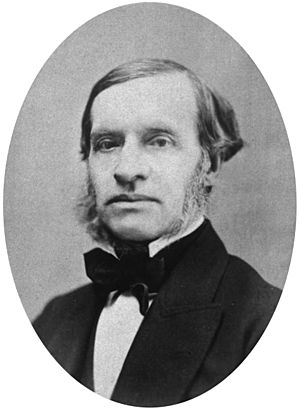William Guy facts for kids
William Augustus Guy (born June 13, 1810 – died September 10, 1885) was an important British doctor and expert in medical statistics. He studied how health and illness affected groups of people.
A Look at His Life
William Augustus Guy was born in Chichester, England. He went to school at Christ's Hospital. Later, he studied medicine at Guy's Hospital. He also traveled to Europe to learn more, studying at the University of Heidelberg in Germany and the University of Paris in France. He earned his medical degree from the University of Cambridge in 1837.
In 1842, Dr. Guy became a professor at King's College London. He taught about forensic medicine. This is a field that uses medical knowledge to help solve legal cases. He also worked as a doctor at King's College Hospital. From 1846 to 1858, he was the dean of the medical school there.
From 1859 to 1869, Dr. Guy worked at Millbank Prison. He helped the government improve health, food, and cleanliness for people there. He was like an official advisor on prison health.
He also worked with the Royal Statistical Society. He edited their Journal of the Statistical Society of London from 1852 to 1856. Later, he became the president of the society from 1873 to 1875. Today, the society still gives out the Guy Medals in his honor. These medals recognize important work in statistics.
Dr. Guy was also a vice-president of the Royal Society from 1876 to 1877. He gave special lectures at the Royal College of Physicians. These included the Croonian lecture in 1860 and the Lumleian lecture in 1868. He also gave the Harveian Oration in 1875.
He helped start the Health of Towns Association. This group worked to make cities healthier places to live. He was also part of a group that looked into how people in prison were treated.
His Important Works
Dr. Guy wrote many important books and papers. His book Principles of Forensic Medicine, first published in 1844, became a very important guide. Later editions of this book were updated by Dr. David Ferrier.
Here are some of his other major works:
- R. Hooper's Physician's Vade-Mecum; enlarged and improved by W.A.G. (1842). This was an updated version of a medical guide by Robert Hooper.
- T. Walker's Original, edited with additions by W.A.G. (1875). This was based on a publication by Thomas Walker.
- Public Health; a Popular Introduction to Sanitary Science, Part 1 in 1870 and Part 2 in 1874. These books helped people understand public health.
- The Factors of the Unsound Mind, with special reference to the Plea of Insanity in Criminal Cases (1881). This book looked at mental health in legal cases.
- John Howard's Winter's Journey (1882).
Dr. Guy also gave many lectures and wrote papers for the Statistical Society. Some of his papers explored how jobs affect health. He also wrote about how long people live in different groups. Other topics included how being sober relates to how long people live. He also studied health in London hospitals and prison diets. One paper looked at the important work of John Howard, a prison reformer.
 | George Robert Carruthers |
 | Patricia Bath |
 | Jan Ernst Matzeliger |
 | Alexander Miles |


